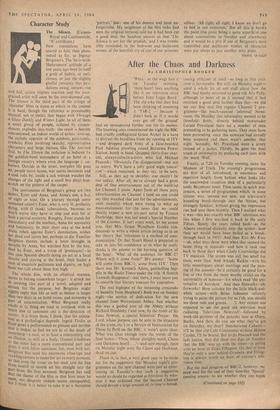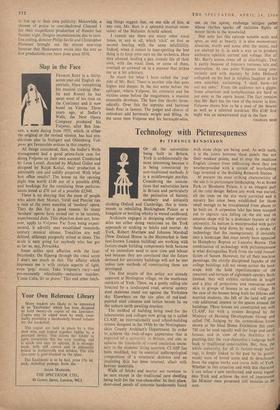After the Chaos and Darkness
By CHRISTOPIIER BOOKER
'WELL.' as the wags had it on Tuesday morning. 'there hasn't beer. anything like it on television since before John Logie Baird.' The old joke that they had been thinking of renaming it 'TSR-2 — because it didn't look as if it would ever get off the ground' had an unsuspected further run for its money. The knowing ones remembered the night the BBC had cruelly conflagrated Grace Archer in a barn to distract the headlines from the opening of ITV —and dropped dark hints of a false-bearded Paul Adorian prowling round Battersea Power Station, bomb in hand. Quipped thirty-four-year- old, always-calm-in-a-crisis whiz kid Michael Peacock : 'Obviously I'm disappointed—but not to worry. We'll have a jolly good night tomor- row'—which remained, as they say, to be seen.
Still, as they say in showbiz, one mustn't be too unfair. After all, we've already had a great deal of free entertainment out of the build-up for Channel 2 alone. Apart from all those jazzy advertisements on Channel I (and no one could say they watched that just for the advertisements, until recently) which were trying to whip up mass-excitement for the news that we could shortly expect a new six-part serial by Francis Durbridge, there was last week's Special Number of the Listener. It isn't every week, let me assure you, that Mrs. Grace Wyndham Goldie con- descends to write a whole article letting us in on her theory that 'television is a method of com- munication.' Or that Stuart Hood is prepared to take us into his confidence as to what he really thinks is the answer to the burning question of the hour: 'What of the audience for BBC-2? Where will it come from?' His answer: 'Some will come from BBC-1; some from ITV.' Then there was Mr. Kenneth Adam, gambolling hap- pily in the Radio Times under the title 'A Stretch Towards Happiness'—but there, 1 must leave you to unearth that literary treasure for yourselves.
The real highspot of the mounting crescendo of banality from Shepherd's Bush was on Sunday night—the service of dedication for the new channel from Westminster Abbey. Just whether this was a guided tour of the Abbey without Richard Dimbleby ('and now, by the tomb of Sir Isaac Newton, a special Scientists' Prayer: Oh Lord, whose purpose can be seen in the structure of the atom, etc.') or a Service of Intercession for Those In Peril on the BBC, it wasn't quite clear. What was clear enough were the words of the final hymn—Thou, whose almighty word, Chaos and Darkness heard ...'—and sure enough, there on Monday night were the Chaos and Darkness, dead on cue.
There is, in fact, a very good case to be made out for the suggestion that Monday night's pro- grammes on the new channel were just as enter- taining as Tuesday's—but such a suggestion would no doubt be regarded as frivolous by who- ever it was ordained that the Second Channel should devote a large amount of its time to broad- casting criticism of itself--so long as that criti- cism is favourable. But still, on Monday night— amid a whole _lot of sob stuff about how the BBC had finally returned to good old Ally Pally, although to most of us it seemed that it had returned a good deal farther than that—we did see our first real live regular Channel 2 pro- gramme—the much-vaunted 'informal' News- room. On Monday this informality seemed to be threefold; firstly, directly behind newsreader Gerald Priestland there sat a number of men pretending to be gathering news. They must have been pretending, since this newscast had already been prepared and there wasn't another that night. Secondly, Mr. Priestland wore a jersey instead of a jacket. Thirdly, he gave the final touch of informality by prefacing each item with the word 'Well.'
Finally, at 7.20 on Tuesday evening, came the Moment of Truth. The evening's programmes are first of all introduced, at enormous and repetitive length, from behind what looks like the unattended reception desk of a particularly seedy Bayswater hotel. Then came, in quick pro- cession, a series of programmes which, in some sinister way, seemed not new, not television's bounding break-through into the Sixties, but strangely familiar, without giving the impression one had seen them recently. Then I realised what it was—this was exactly what BBC television was like when I first watched it back in the early Fifties. Slowly the years rolled back—as the Alberts cavorted dismally over the screen—how their act would have been hailed as a break- through back in 1951! And then Kiss Me Kate —ah, what days those were when that seemed the latest thing in musicals—and how it took one back to those days when Cicely Courtneidge did TV musicals. The screen was still too small for them, even then. And Arkady Raikin—with his little monologues about marriage and the pass- ing of the seasons—he'd certainly be good for a line or two from the more worthy critics on the universality of humour—for which read 'the uni- versality of boredom.' And then fireworks—ah, fireworks! How suitable for the little black-and- white screen—with Brian Johnston valiantly trying to paint the picture for us ('ah, you should see those reds and greens. .. .'). Any minute one expected to see the good old television mast radiating 'Television Newsreel'—followed by week-old pictures of the pancake race at Olney, Bucks. And then, do you see what they've got on Saturday, my dear? International Cabaret:— it'll be that old Café Continental without Helene Cordet, I'll be bound. But to do Peacock and the lads justice, they did show one sign on Tuesday that the BBC was up with the times--in giving over an hour to Duke Ellington. On that at least they're only a year behind Granada, and Elling- ton is always worth an hour of anyone's tele- vision time.
For the real progress of BBC-2, however, we must wait for the end of their nine-day 'Special' opening season—to see whether they can begin (Continued on page. 552) to live up to their own publicity. Meanwhile, a shower of praise to overshadowed Channel 1 for their magnificent production of Hamlet last Sunday night. Despite inconsistencies due to care- less cutting, director Philip Savile and Christopher Plummer brought out the almost non-stop humour that Shakespeare wrote into the text as few productions can have done since 1616.







































 Previous page
Previous page